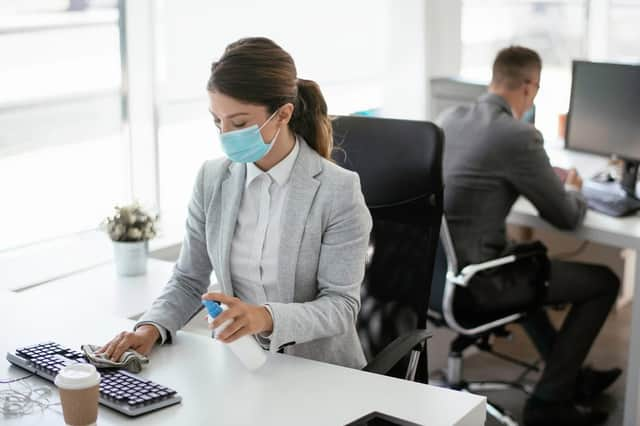The government is launching a campaign to encourage workers to return to offices - but is it safe?


Workers are to be encouraged to head back to offices in a new campaign from the UK government starting this week.
In a series of new adverts, the government will emphasise the benefits of returning to workplaces and encourage businesses to make their offices Covid-secure, to allow for the safe return of employees.
Advertisement
Hide AdAdvertisement
Hide AdIs it safe to return to offices?
The new back to offices campaign will launch this week as most schools in England and Wales reopen to pupils, and will predominantly be promoted through regional media.
At the start of August, the UK government changed its advice on working from home to encourage employers to work with staff and get them back to the office.
Businesses have been warned of the damage home working is causing to city centres as people continue to stay away from workplaces, with employers now being asked to reassure their staff it is safe to return, highlighting measures that have been taken to prevent the spread of coronavirus.
Health Secretary Matt Hancock has suggested that employees in England are safe to return to workplaces, as Test and Trace data has shown the virus is predominantly passed on through household gatherings, rather than in workplaces.
Advertisement
Hide AdAdvertisement
Hide AdAs such, ministers are not currently considering making masks compulsory in workplaces in England.
This decision is in stark contrast to France, where officials are currently planning to make face coverings compulsory in most work environments in response to a recent rise in cases.
Speaking about the decision not to follow in France’s footsteps, Mr Hancock told BBC Breakfast: “We constantly look at the scientific advice and the answer here is that we are not currently considering doing that.
“And the reason is that the evidence from NHS Test and Trace that we are talking about for where people catch the disease is that very largely they catch it from one household meeting another household, usually in one of their homes.
Advertisement
Hide AdAdvertisement
Hide Ad"So it is that household transmission that is the core, the root of passing on this virus in this country. The amount of people who have caught it in workplaces is relatively low, we think, from the evidence that we have got."
Do I have to return to the office?
Whitehall sources have insisted the campaign for returning to work will not put those who continue to work from home at any greater risk of losing their jobs.
Labour's shadow business minister, Lucy Powell, said no one should be forced "to choose between their health and their job" and the government should "categorically rule out" any campaign suggesting people could be out of a job if they refused to return to the office.
Despite the push for a return to workplaces in England, ministers in Scotland, Wales and Northern Ireland are still advising people to work from home if possible.
Advertisement
Hide AdAdvertisement
Hide AdScotland’s First Minister Nicola Sturgeon said she does not want to see people “intimidated” into returning to workplaces before it is safe, adding that her government has been discussing the possibility of a phased return to office working.
However, she warned that it is still too soon for people to go back to offices as normal without the virus spreading.
Many businesses have also continued to advise most of their staff to continue home working and studies have shown many people prefer it to being office-based.
Nine in 10 UK employees who have worked from home during lockdown have said they would like to continue in some form, with research from Cardiff and Southampton universities suggesting the majority of home workers are just as productive, if not more.
Advertisement
Hide AdAdvertisement
Hide AdHow will offices be made safe?
Before reopening to workers, offices must undertake a health and safety risk assessment to ensure they are Covid-secure.
This includes putting staff on staggered works shifts to avoid overcrowding, providing hand washing and hand sanitising facilities, avoiding large meetings to reduce the number of staff in the same room for a period of time, and ensuring staff are able to stay socially distant.
Staff should also be provided with their own equipment to avoid sharing and doors and windows should be kept open where possible to increase ventilation.